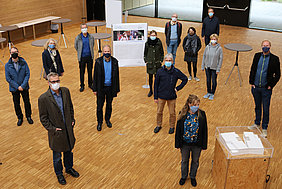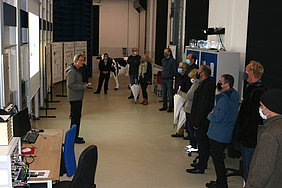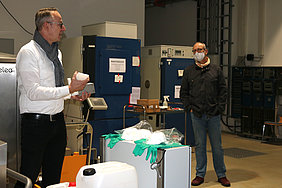On October 8 and 9, the partners in the Leibniz research alliance INFECTIONS met for their 11th plenary meeting at ATB in a hybrid event. Research projects addressing the spread of coronavirus and the fair distribution of Covid-19 medicines and vaccines on a global and national level were also discussed.
Rising numbers of Covid-19 infections, but also rising antibiotic resistances, emerging and partly unknown pathogens, climate change and expanding human mobility are increasingly confronting society with new global problems. Infectious diseases can spread and be transmitted to humans in many different ways. In order to understand these mechanisms and to define strategies for improved infection control, a holistic approach is required. Biomedical, ecological, socio-economic and political aspects must be taken into account.
The objective of the interdisciplinary research alliance INFECTIONS is to develop new strategies and methods for early warning systems, also with public participation, improved outbreak management and optimized containment of the spread of pathogens.
In regard to the current corona pandemic, INFECTIONS supports three interdisciplinary research projects dealing with the spread of the corona virus and the fair distribution of Covid-19 medicine and vaccines on a global and national level.
In the "Aerosols" project, ATB scientists and partners are investigating the transmission paths via aerosols. The inhalation of virus-containing fluid particles, which are produced during exhalation, coughing, speaking and sneezing of infected persons, is considered the most important transmission route for the infection with the coronavirus Sars-CoV-2. In contrast to other corona viruses, such as MERS or SARS, where droplet infection is regarded as the main transmission pathway, there is growing evidence that Sars-CoV-2 can also spread via aerosols in the air. The effectiveness of this transmission pathway is strongly dependent on the resistance of the virus particles in the air, which is determined by several factors. The influence of the structure and size of the aerosol particles, their origin and humidity on the efficiency of transmission is therefore being investigated. At ATB, among other aspects, dispersion processes are investigated by means of the ATB wind tunnel. Partners in the project "Aerosols" are: Research Center Borstel, Leibniz Lung Center (FZB), Leibniz Institute for Agricultural Engineering and Bioeconomy (ATB), Heinrich-Pette-Institute, Leibniz Institute for Experimental Virology (HPI), Robert Koch Institute (RKI) and Free University of Berlin.
Contact ATB: Prof. Dr. Thomas Amon
A short tour to selected ATB research facilities completed the conference program. In the ATB wind tunnel Thomas Amon, David Janke and Barbara Amon presented current research work in the field of animal husbandry. Oliver Schlüter and Antje Fröhling explained research approaches in the field of food safety and presented innovative methods for the gentle inactivation of pathogenic germs on food.



